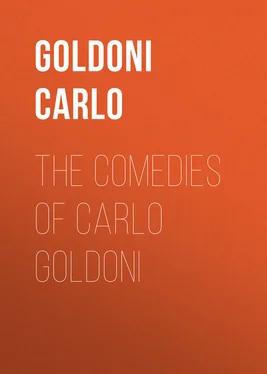Carlo Goldoni - The Comedies of Carlo Goldoni
Здесь есть возможность читать онлайн «Carlo Goldoni - The Comedies of Carlo Goldoni» — ознакомительный отрывок электронной книги совершенно бесплатно, а после прочтения отрывка купить полную версию. В некоторых случаях можно слушать аудио, скачать через торрент в формате fb2 и присутствует краткое содержание. Жанр: foreign_antique, foreign_prose, foreign_dramaturgy, на английском языке. Описание произведения, (предисловие) а так же отзывы посетителей доступны на портале библиотеки ЛибКат.
- Название:The Comedies of Carlo Goldoni
- Автор:
- Жанр:
- Год:неизвестен
- ISBN:нет данных
- Рейтинг книги:5 / 5. Голосов: 1
-
Избранное:Добавить в избранное
- Отзывы:
-
Ваша оценка:
- 100
- 1
- 2
- 3
- 4
- 5
The Comedies of Carlo Goldoni: краткое содержание, описание и аннотация
Предлагаем к чтению аннотацию, описание, краткое содержание или предисловие (зависит от того, что написал сам автор книги «The Comedies of Carlo Goldoni»). Если вы не нашли необходимую информацию о книге — напишите в комментариях, мы постараемся отыскать её.
The Comedies of Carlo Goldoni — читать онлайн ознакомительный отрывок
Ниже представлен текст книги, разбитый по страницам. Система сохранения места последней прочитанной страницы, позволяет с удобством читать онлайн бесплатно книгу «The Comedies of Carlo Goldoni», без необходимости каждый раз заново искать на чём Вы остановились. Поставьте закладку, и сможете в любой момент перейти на страницу, на которой закончили чтение.
Интервал:
Закладка:
De la Cot. Ah, no, Mademoiselle! do not tax me with ingratitude, do not accuse me of cruelty. I thought, by my departure, to do you an act of kindness. If I am wrong, pardon me. If you command it, I will remain.
Gian. No; my commands shall never control your inclination; follow the dictates of your own heart.
De la Cot. My heart tells me to remain.
Gian. Then obey it without fear, and, if your courage does not fail, rely on my constancy.
De la Cot. What will your father say to my change of mind?
Gian. He is almost as much grieved at your departure as I am; he is not satisfied about your recovery; and whether it is the consequence of your wound, or of mental affliction, the surgeons do not believe your health is re-established, and my father thinks it too soon for you to undertake the journey. He loves and esteems you, and would be much pleased at your remaining.
De la Cot. Has he any suspicion of my love for you? and that it is mutual?
Gian. Our conduct has given him no cause for suspicion.
De la Cot. Can it be possible it has never passed through his mind that I, an open, frank man, and a soldier, might be captivated by the beauty and merit of his daughter?
Gian. A man like my father is not inclined to suspicion; the cordiality with which he received you as a guest in his family, assures him he may rely on the correct conduct of an officer of honour; and his knowledge of my disposition makes him perfectly easy: he does not deceive himself in regard to either of us. A tender passion has arisen in our hearts, but we will neither depart from the laws of virtue, nor violate his confidence.
De la Cot. Is there no hope his goodness may make him agree to our marriage?
Gian. My hope is that in time it will; the obstacles do not arise from motives of interest, but from the customs of our nation. Were you a merchant of Holland, poor, with only moderate expectations, you would immediately obtain my hand, and a hundred thousand florins for an establishment; but an officer, who is a younger son, is considered among us as a wretched match, and were my father inclined to give his consent, he would incur the severe censure of his relations, his friends, and indeed of the public.
De la Cot. But I cannot flatter myself with the prospect of being in a better condition.
Gian. In the course of time circumstances may occur that may prove favourable to our union.
De la Cot. Do you reckon among these the death of your father?
Gian. Heaven grant that the day may be distant! but then I should be my own mistress.
De la Cot. And do you wish me to remain in your house as long as he lives?
Gian. No, Lieutenant; stay here as long as your convenience permits, but do not appear so anxious to go while there are good reasons for your remaining. Our hopes do not depend on the death of my father, but I have reasons to flatter myself our attachment in the end may be rewarded. Our love we must not relinquish, but avail ourselves of every advantage that occasion may offer.
De la Cot. Adorable Giannina, how much am I indebted to your kindness! Dispose of me as you please; I am entirely yours; I will not go unless you order me to do so. Persuade your father to bear with my presence, and be certain that no place on earth is so agreeable to me as this.
Gian. I have only one request to make.
De la Cot. May you not command?
Gian. Have regard for one defect which is common to lovers; – do not, I entreat you, give me any cause for jealousy.
De la Cot. Am I capable of doing so?
Gian. I will tell you. Mademoiselle Costanza, in the last few days, has visited our house more frequently than usual; her eyes look tenderly on you, and she manifests rather too much sympathy for your misfortunes. You are of a gentle disposition, and, to own the truth, I sometimes feel uneasy.
De la Cot. Henceforth I will use the greatest caution, that she may indulge no hopes, and that you may be at ease.
Gian. But so conduct yourself, that neither my jealousy nor your love for me shall be remarked.
De la Cot. Ah, would to Heaven, Mademoiselle, our troubles were at an end!
Gian. We must bear them, to deserve good fortune.
De la Cot. Yes, dearest, I bear all with this delightful hope. Permit me now to inquire for my servant, to get him to countermand the horses.
Gian. Were they ordered?
De la Cot. Yes, indeed.
Gian. Unkind one!
De la Cot. Pardon me.
Gian. Let the order be countermanded before my father knows it.
De la Cot. My hope and my comfort! may Heaven be propitious to our wishes, and reward true love and virtuous constancy.
[Exit.Gian. I never could have believed it possible for me to be brought to such a step; that I should, of my own accord, use language and contrive means to detain him. But unless I had done so, in a moment he would have been gone, and I should have died immediately afterwards. But here comes my father; I am sorry he finds me in our visitor's room. Thank Heaven, the Lieutenant is gone out! All appearance of sorrow must vanish from my face.
Phil. My daughter, what are you doing in this room?
Gian. Curiosity, sir, brought me here.
Phil. And what excites your curiosity?
Gian. To see a master who understands nothing of such things, and an awkward servant endeavouring to pack up a trunk.
Phil. Do you know when he goes away?
Gian. He intended going this morning, but, in walking across the room, his legs trembled so, that I fear he will not stand the journey.
Phil. I think his present disease has deeper roots than his wound.
Gian. Yet only one hurt has been discovered by the surgeons.
Phil. Oh, there are wounds which they know nothing of.
Gian. Every wound, however slight, makes its mark.
Phil. Eh! there are weapons that give an inward wound.
Gian. Without breaking the skin?
Phil. Certainly.
Gian. How do these wounds enter?
Phil. By the eyes, the ears, the touch.
Gian. You must mean by the percussion of the air.
Phil. Air! no, I mean flame.
Gian. Indeed, sir, I do not comprehend you.
Phil. You do not choose to comprehend me.
Gian. Do you think I have any mischievous design in my head?
Phil. No; I think you a good girl, wise, prudent, who knows what the officer suffers from, and who, from a sense of propriety, appears not to know it.
Gian. [ Aside. ] Poor me! his manner of talking alarms me.
Phil. Giannina, you seem to me to blush.
Gian. What you say, sir, of necessity makes me blush. I now begin to understand something of the mysterious wound of which you speak; but, be it as it may, I know neither his disease nor the remedy.
Phil. My daughter, let us speak plainly. Monsieur de la Cotterie was perfectly cured a month after he arrived here; he was apparently in health, ate heartily, and began to recover his strength; he had a good complexion, and was the delight of our table and our circle. By degrees he grew sad, lost his appetite, became thin, and his gaiety was changed to sighs. I am something of a philosopher, and suspect his disease is more of the mind than of the body, and, to speak still more plainly, I believe he is in love.
Gian. It may be as you say; but I think, were he in love, he would not be leaving.
Читать дальшеИнтервал:
Закладка:
Похожие книги на «The Comedies of Carlo Goldoni»
Представляем Вашему вниманию похожие книги на «The Comedies of Carlo Goldoni» списком для выбора. Мы отобрали схожую по названию и смыслу литературу в надежде предоставить читателям больше вариантов отыскать новые, интересные, ещё непрочитанные произведения.
Обсуждение, отзывы о книге «The Comedies of Carlo Goldoni» и просто собственные мнения читателей. Оставьте ваши комментарии, напишите, что Вы думаете о произведении, его смысле или главных героях. Укажите что конкретно понравилось, а что нет, и почему Вы так считаете.












